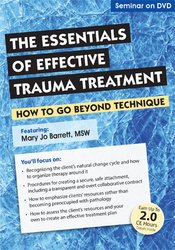Description
When it comes to working with complex developmental trauma, it seems like therapists can’t get enough tools for their tool bag. And yet what determines effectiveness in this challenging arena of practice are crucial dimensions of the therapeutic relationship that go beyond any technical intervention. In this workshop, we’ll explore what trauma clients themselves say about the key elements in their own experience of healing. You’ll focus on:
- Recognizing the client’s natural change cycle and how to organize therapy around it
- Procedures for creating a secure, safe attachment, including a transparent and overt collaborative contract
- How to emphasize clients’ resources rather than becoming preoccupied with pathology
- How to assess the client’s resources and your own to create an effective treatment plan
CPD
CPD
- PESI Australia, in collaboration with PESI in the USA, offers quality online continuing professional development events from the leaders in the field at a standard recognized by professional associations including psychology, social work, occupational therapy, alcohol and drug professionals, counselling and psychotherapy. On completion of the training, a Professional Development Certificate is issued after the individual has answered and submitted a quiz and course evaluation. This online program is worth 2.0 hours CPD for points calculation by your association.
Faculty
Mary Jo Barrett, MSW, is the founder and director of the Center for Contextual Change, and the coauthor of Treating Complex Trauma: A Relational Blueprint for Collaboration and Change and Systemic Treatment of Incest.
Speaker Disclosures:
Financial: Mary Jo Barrett is the founder and director of the Center for Contextual Change. She has no relevant financial relationships with ineligible organizations.
Non-financial: Mary Jo Barrett has no relevant non-financial relationship to disclose.
Target Audience
Psychologists, Physicians, Addiction Counselors, Counselors, Social Workers, Marriage & Family Therapists, Nurses, and other Behavioral Health Professionals
Outline
- Creating a Context for Change
- Micro and macro perspectives
- Awareness and attunement to when you use (or don’t use) 5 essential ingredients
- failure in therapy is failure to notice these 5 ingredients
- key to therapy and life changes is recognizing when you use and do not use them
- Discuss with clients the process of therapy
- Understand client’s goals
- Explain therapy processes that enable change to happen
- Build collaboration, interaction and engagement
- Ask client, “what do you want to know about me?” (note: this was discussed during Role Play)
- Challenging Patterns/Cycles and Expanding Realities: a Collaborative Change model
- Fractal model: repeating patterns of the 5 essential ingredients, within and between sessions
- Concept-driven, universal model
- Adapt to the needs and goals of each client: therapy as an art form
- Challenges client and therapist to think differently
- Use the Five Essential Ingredients for Healing
- Attachment and connection: help clients build relationships with you and others
- Create a sense of belonging, mutual curiosity, compassion, empathy
- Communicate with collaborative conversations that validate the client
- Connect to a deep set of values that provide meaningful vision
- Safety and empowerment: build refuge by creating boundaries
- Explain your therapeutic model and why you chose to use this approach
- Expect client challenges
- Values: use collaborative, strength-based guidance
- Generate discussion of vulnerabilities and resources, and how to use them in the moment
- Recognize the universal nature of challenge and change
- Skills: learn and apply many therapeutic models (discussed primarily during “Role Play”)
- Apply psycho-educational and therapeutic approaches
- Identify resources for client success
- Hope: expecting the possibility of change (discussed primarily during “Role Play”)
- Use resources to create possibilities
- Build expectations in clients
- Accept finite possibilities to create infinite hope
- Consolidation and repetition: pause, reflect, and combine experiences
- Harness the natural cycle of change and growth through using these 3 steps in the Collaborative Change Model,
- Recognize and repeat the 5 Essential Ingredients for Healing
- Build skills for therapeutic intervention
- (the following points outline the speaker’s final hour with audience participation)
- Role play demonstrations with participants:
- Pictionary: draw a time you felt safe when growing up in your family
- Pause and reflect, to contract and consolidate
- all clients are asked to keep a journal of resources to use in the process of change
- contrast vulnerabilities with resources
- write one thing you will take with you from session today; distil this to one word
Objectives
- Assess the client’s natural change cycle and how to organize therapy around it
- Develop procedures for creating a secure, safe attachment, including a transparent and overt collaborative contract
- Support clients’ resources rather than becoming preoccupied with pathology
- Assess the client’s resources and your own to create an effective treatment plan


